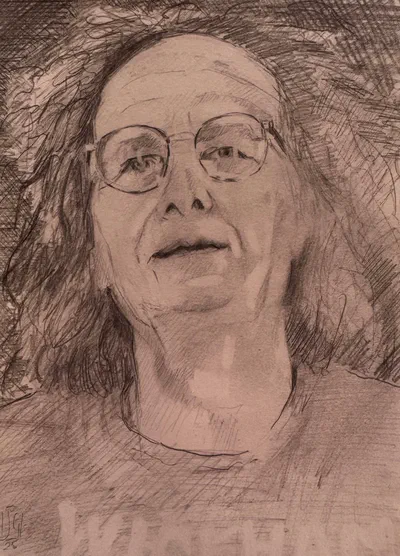Tony Hirst, aka Monty, is a traditional storyteller based on the Isle of Wight, with regular stop-off points variously around the country (Plymouth, Huddersfield, Ross-on-Wye).
Telling Biography
A listener of tales for thirty years or more, with fond memories of regular trips to FaTE at Wenlock Edge, it took twenty-five years or so before Monty told at his first tale at a story circle in the story-tent organised by the Island Storytellers at Rhythm Tree Festival in 2019. His first folk-night tale followed in the October, just before Covid struck. Following lockdown, he started back telling again at two or three folk nights a week, every week, for a year or two.
Teaming up with fellow members of the Island Storytellers, Sue Bailey and Holly Medland, Three Island Storytellers performed their first show in March 2022, renaming as ‘Tis Tales for a Ventnor Fringe show in July 2022.
In February 2023, Monty started performing his own solo shows, telling primarily out of Babushka Books in Shanklin, Isle of Wight, with a first solo fringe show at Ventnor Fringe in 2023, and with his first trips telling at fringe festivals off the Island in 2025.
2023 was also the year in which Monty was involved in bidding for and co-leading the Arts Council and National Lottery funded Somewhen Storytelling project, which promoted the Somewhen Storytelling Festival and a range of training and storytelling development opportunities across the Isle of Wight. Although Somewhen Storytelling as an initiative is currnetly on hold, its legacy and inspiration continues to grow to this day.
In 2024, Monty teamed up with harpist Theresa Ellis to form Stories’n’Harp, later also accompanied by singer Jenni Charity. The performances concentrated mediaeval on old British and Irish tales with harp and song accompaniment, and included shows at Monkton Arts, Ryde, and Ventnor Fringe.
In 2025, he joined forces with folk duo Glenn Koppany and Sue Cain, aka The AnyWhens, initially taking 15 mins song’n’story turns at The Star Cider’n’Sausage festival in Ryde, before putting together their first show, “Protest Days, Rebellion Nights”, which quickly sold out at Ventnor Fringe 2025.
Building on his origins telling at folk nights and open mic nights, Monty has also been taken chances whenever he can telling pop-up tales in tea tents (The Magic Teapot, The Tiny Tea Tent, The Somthing Else Tea Tent) at various music festivals (Beautiful Days, Bearded Theory, Wickham Festival) since 2023, extending the “Tea Tales” pop-up telling to include the Two Cooks cafe as part of Ventnor Fringe, 2025.
In between shows, Monty continues to tell tales at open mic nights, folk nights and story clubs whenever the chance arises, and wherever in the country he may be…
Personal Motivation
As with many other tellers, the stories that I like tell are, by preference, stories I’ve heard others tell before me, ideally stories that they in turn have heard from tellers before them, in an unbroken line of oral tradition dating back maybe even as far as the time of once. Or at least, that’s what we tell ourselves.
But that’s all a myth, of course, a lie we tell to ourselves, for a couple of reasons. Firstly, oral tales dip in to and out of printed collections. Stories are collected, and published, and then brought back into oral culture. Secondly, when a teller hear’s a tale, they’re often motivated to find other variants of it, to try to take it back to one or more possible sources, and then come to their own telling of it.
The stories that speak most to me are stories that have origins a hundred years or more ago: which is to say, that were first collected a hundred years or more ago. Rather like entering an old Church that still echoes today with the rituals of times past, I like the idea that a tale I tell could have been told several generations ago. That, and the fact that the tales are out of copyright!
The stories I tell typically come to me in the following ways: stories I’ve heard, stories I’ve found in old collections (often, old collections), and stories I’ve encountered as reports of historical events that I’ve then worked up into tales. Of the stories found in collections, it’s important to me that they are of a folk tradition: I don’t get on with many of Hans Christian Andersen’s tales becuase they’re his. It’s important to me that in a certain sense we don’t know the author, although it helps if we do know something of the oral history from which the tale was collected. What’s most important to me, though, is that the story works for me. If it doesn’t, I can’t remember it and I can’t tell it. If it does, it only takes one hearing or one reading and it’s there…
Contact
Email: monty DOT storyteller AT gmail DOT com
Facebook / monty.storyteller
Instagram / montystoryteller
